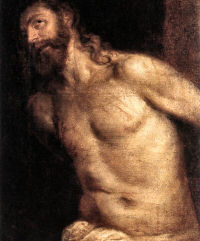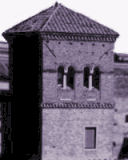On the Holy Communion
March 30, 2015 by Dan Burke
ON THE HOLY COMMUNION
“Take ye, and eat: this is my body.”
Matthew 26:26
Let us consider the great gift which Jesus Christ has bestowed on us in the institution of the most holy sacrament; the great love he has shown to us in this gift; and his great desire that we should receive this gift. Let us, in the first place, consider the great gift which Jesus Christ has bestowed upon us in giving us himself entirely for our food in the holy communion. St. Augustine says that Jesus Christ, though an omnipotent God, has nothing more to give us. “Cum esset omnipotens, plus dare non potuit.” And what greater treasure, adds St. Bernardine of Siena, can a soul receive or desire, than the sacred body of Jesus Christ? “Quis melior thesaurus in corde hominis esse potest, quam corpus Christi?” The prophet Isaiah exclaims, O men, proclaim aloud the loving inventions of our good God (cf Isaiah 12:4). And if our Redeemer had not bestowed this gift upon us, who among us could have asked it? Who could have dared to say to him. Lord, if you wish to make us understand your love, remain under the species of bread, and permit us to make you our food? Even to think of it would be considered folly. “Does it not,” says St. Augustine, “appear foolishness to say. Eat my flesh; drink my blood?” When Jesus Christ made known to his disciples this great gift of the most holy sacrament which he wished to leave us, they could not bring themselves to believe it; and, therefore, they departed from him, saying, “How can this man give us his flesh to eat?…This saying is hard, and who can hear it?” (cf John 6:52, 60). But what men could never imagine, the great love of Jesus Christ has invented and executed.
St. Bernardine says that the Lord has left us this sacrament as a memorial of the love he has shown us in his passion: “Hoc sacramentum est meraoriale suae dilectionis.” And this accords with what Jesus Christ himself has said: “Do this for a commemoration of me” (cf Luke 22:19). The love of our Savior, adds St. Bernardine, was not content with sacrificing his life for our salvation before his death, this love constrained him to bequeath to us the greatest gift which he had ever bestowed upon us, by giving us himself for our food. “In illo fervoris excessu quando paratus erat pro nobit mori, ab excessu a moris majus opus agere coactus est, quam unquam operatus fuerat, dare nobis corpus in cibum” (S. Ber. Sen., tom. ii serm. live. cap. i). The abbot Guerric says that, in this sacrament, Jesus made the last effort of love. “Omnem vim amorise effudit amicis” (Serm. v. de Ascens). This was better expressed by the Council of Trent, which declared that, in the Eucharist, Jesus poured out all the riches of his love for men. “Divitias sui erga homines amoris velut effucit” (Sess xiii cap ii).
How great, says St. Francis de Sales, the tenderness of love which a prince would show to a beggar by sending him a part of what he had on his own plate! How much greater should it be, if he sent him the entire of his own dinner! But what would it be, if he sent him, for his food, a part of his own arm! In the holy communion, Jesus gives us not only a portion of his own dinner, not only a part, but the entire of his body. “Take ye, and eat; this is my body.” And with his body he gives us his soul and his divinity. In a word, St. Chrysostom says that, in giving you himself in the holy communion, he gives you all that he has, and reserves nothing for himself. “Totum tibi dedit, nihil sibi reliquit.” And the angelic doctor says that, “in the Eucharist, God has given us all that he is and has.” Behold! exclaims St. Bonaventure, that God whom the world cannot contain, makes himself our prisoner in the most holy sacrament. “Ecce quern mundus capere non potest, captivus noster est.” And since the Lord gives himself entirely to us in the Eucharist, how can we fear that he should refuse us any grace which we ask of him? “How,” says St. Paul, “hath he not also, with him, given us all things?” (cf Romans 8:32).
Affections and Prayers
O my Jesus, what has induced thee to give thyself entirely to us for our food? After this gift what more remains for thee to give us in order to oblige us to love thee? Ah, Lord, give us light, make us understand the excess of thy love in becoming food in order to unite thyself to poor sinners! But, if thou givest thyself entirely to us, it is just that we too give our whole being to thee. O my Redeemer, how have I been able to offend thee, who hast loved me so tenderly, and who hast done so much to gain my love? Thou hast become man for my sake, thou hast died for me, thou hast become my food; tell me, what more couldst thou have done? I love thee, O infinite Goodness; I love thee, O infinite Love. Lord, come often to my soul; inflame my whole heart with thy holy love grant that I may forget all things in order to think only of thee, and to love nothing but thee. Most holy Mary, pray for me, and by thy intercession make me worthy to receive thy Son frequently in the holy sacrament.
Editor’s Note: This meditation is from St. Alphonsus Liguori’s “Preparation for Death” (1758).


